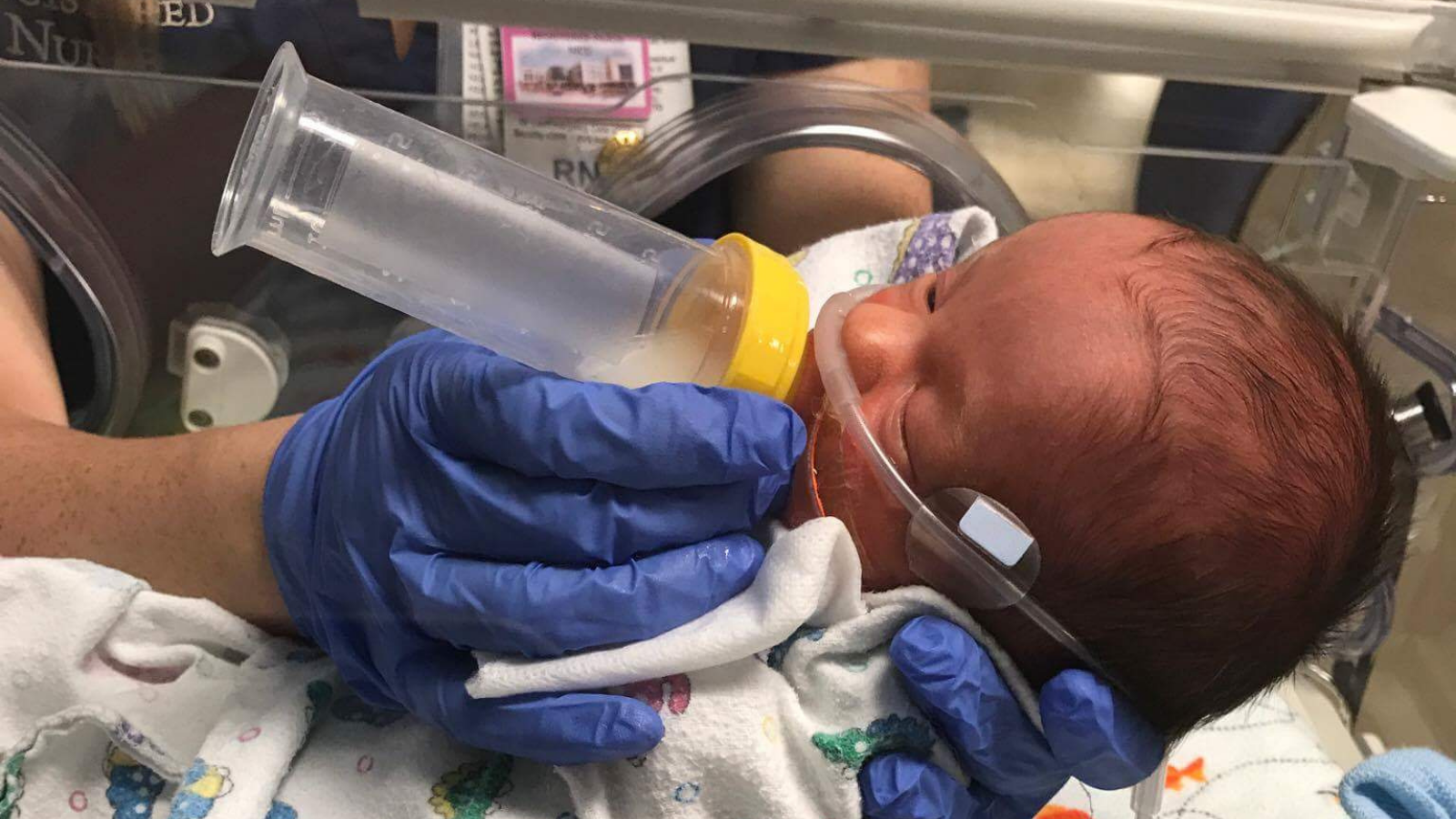
by Trish Ringley, RN
When a baby is in the NICU, there is a good chance that the baby will need extra attention paid to his or her nutrition. So much attention is given to human milk and breastfeeding that by now most people are very well aware that human milk is the ideal feeding for most infants. But it’s not always the very best for babies in the NICU! Parents of babies in the NICU are often surprised to learn that sometimes a mother’s breast milk isn’t enough. In that case, they may need human milk fortifiers.
While the nutrient composition of human milk is ideal for healthy term infants, the truth is that the protein and mineral content of human milk is insufficient to meet the needs of sick or preterm babies.
NICU doctors & nutritionists will often recommend adding extra nutrients to a mother’s pumped milk; this is known as “fortifying milk.”
Fortification of human milk is necessary to supply the additional nutrients a baby requires and to support the rapid rate of growth and bone mineralization in the preterm and sick infant.
So let’s look at the questions most NICU families have about fortifier.
What are human milk fortifiers?
Commercial human milk fortifiers (HMF) are predominantly a protein and mineral supplement. It’s a boost of extra nutrition in a concentrated form. They typically contain additional calories, electrolytes and vitamins as well.
What are fortifiers made from?
There are two main types of human milk fortifier available currently. First is a fortifier made using dairy cow-based protein, and these fortifiers are manufactured both as powders and liquids which get added to pumped human milk.
The second is a fortifier that is actually made of human milk which has been donated by pumping mothers. The only manufacturer of this type of fortifier in the US currently is Prolacta Bioscience, and it is only made available to hospitals. They use donated milk to create a liquid concentrate which arrives to the NICU frozen and is kept frozen until it’s ready to be used. Pumped mother’s milk is added to the concentrate and then is fed to the infant just as plain milk would be.
Why not just feed the baby more milk?
Unfortunately, a baby’s stomach is very small and can only handle so much milk. Try to feed a baby more than their stomach can hold and they’ll end up spitting it up, having severe reflux, or even more serious gastrointestinal complications.
This means babies can only be fed a limited volume of milk. So in that small volume of milk, if the nutritional content is boosted by fortifying the milk, they can get the nutrients they need in a volume that doesn’t upset their sensitive tummies.
Do fortifiers cause any problems?
Digestion is a struggle for many babies in the NICU. Whether it’s because a preterm baby’s gut isn’t fully developed and optimized for digestion, or because an infant is sick and under stress, the gut is very sensitive and it’s something the NICU staff are watching closely in all of the babies.
Plain human milk is usually the easiest milk for babies to digest, and sometimes adding fortifier to human milk can increase the chances of GI complications. But it’s worth that risk because the need for the added nutrients is vital. Without good nutrition, it’s much harder for babies to fight off and heal from illnesses.
Some research does indicate that using human milk fortifiers only (no cow milk in the diet at all) result in lower incidents of serious medical complications than cow milk fortifiers or cow milk based formula. These include lower rates of NEC (necrotizing enterocolitis – an illness of the gastrointestinal tract) and BPD (bronchopulmonary dysplasia – an illness of the lungs). But not all NICUs have access to human milk based fortifiers, so many babies receive cow milk based fortifiers.
Why are the extra nutrients needed?

Growth! All babies, at all stages and ages, really are growing machines and they depend upon optimal nutrition to grow healthy bodies. Every part of their body is counting on a complex mixture of nutrients to help them optimize their short-term and long-term health.
Babies born early miss out on a surge of nutrient absorption that normally would have occurred during the third trimester, so that’s one reason they need additional nutrients. A preemie’s gastrointestinal tract is also very immature, less efficient at processing nutrients and more prone to distress. And preemies often experience medical complications including infection, respiratory disorders, surgeries, and stress, all of which increase a baby’s metabolism. So babies born prematurely have multiple reasons for needing more nutrients than an otherwise healthy full-term baby.
How long do babies need human milk fortifiers?
This depends upon your baby’s medical condition, nutritional status, and the typical practices of your NICU. It’s very common for NICU graduate babies to require special nutrients even after going home. This might be as simple as adding small amounts of over-the-counter preemie formula to your pumped milk, to as complex as using highly specialized prescription formulas.
Feel free to ask your NICU staff at any time if you’re curious about what feedings your baby will need at home.
If my baby needs fortifier, does it mean there’s something wrong with my milk?
Absolutely not! A mother’s milk is still the ideal main nutrient for most babies most of the time. When a mother can’t provide expressed milk for her baby, for whatever reason, the next best choice is usually donor human milk, because human milk is better tolerated than formulas for most babies.
But any human milk, whether from mother or donor, will still need fortifying because they simply lack the added nutrients and calories that preemies and sick babies need.
How do I know if my baby is receiving a fortifier?
Ask! Sometimes the NICU staff remember to tell parents about human milk fortifiers being added to a baby’s milk, but it’s such a common practice that sometimes they forget to mention it. So just ask!
In fact, if you ever have any questions at all about your baby while in the NICU, please speak up and talk with the NICU staff. Their goal is to take the best care of your baby possible and that includes keeping parents as involved and informed as possible.
READ NEXT: FEEDING YOUR PREEMIE: INFANT FORMULA 101
 Download the app designed specifically for NICU & bereaved parents. Get support, find community, and learn from educational resources, all in the Hand to Hold app. Available in the App Store and Google Play.
Download the app designed specifically for NICU & bereaved parents. Get support, find community, and learn from educational resources, all in the Hand to Hold app. Available in the App Store and Google Play.

Trish Ringley, RN, is a mother of two and has been a NICU nurse since 1997, practicing in Alaska, Colorado and California. She is a passionate NICU-parent advocate and has recently become active in the online world of NICU parent support. Trish is the founder of Every Tiny Thing, an online store devoted exclusively to serving the needs of NICU families. When she’s not at work at the NICU, you can find Every Tiny Thing on Facebook, Instagram, and at EveryTinyThing.com.
